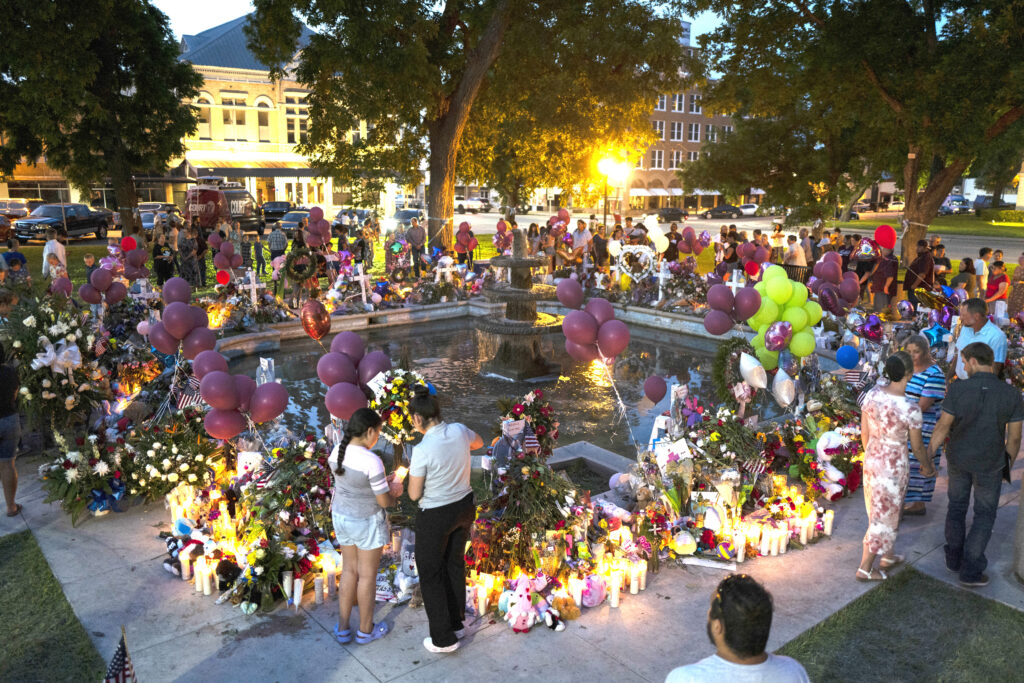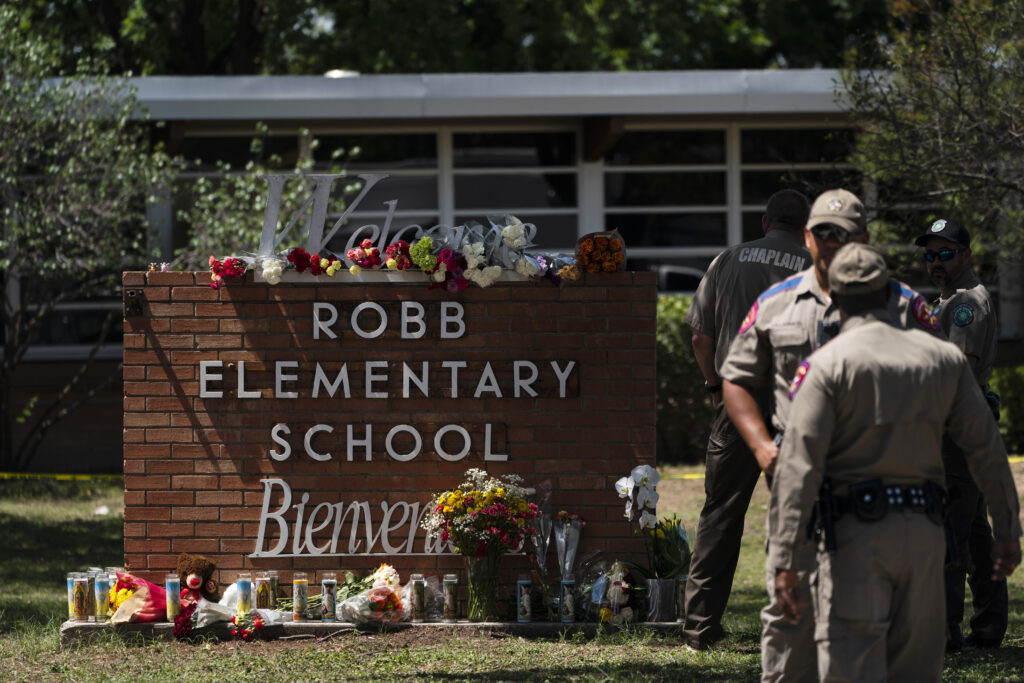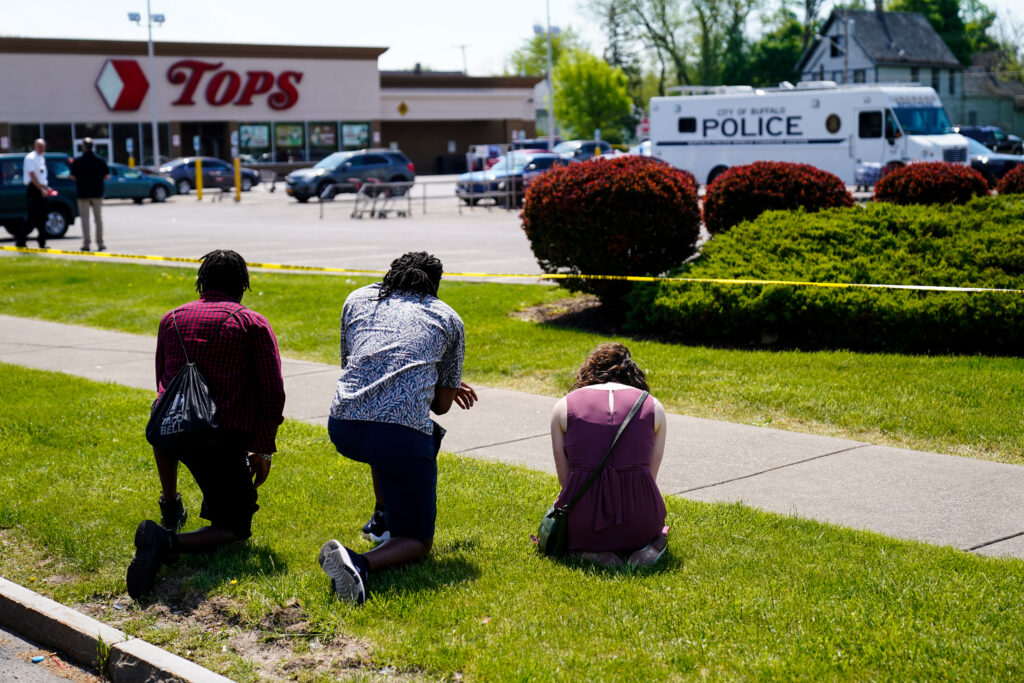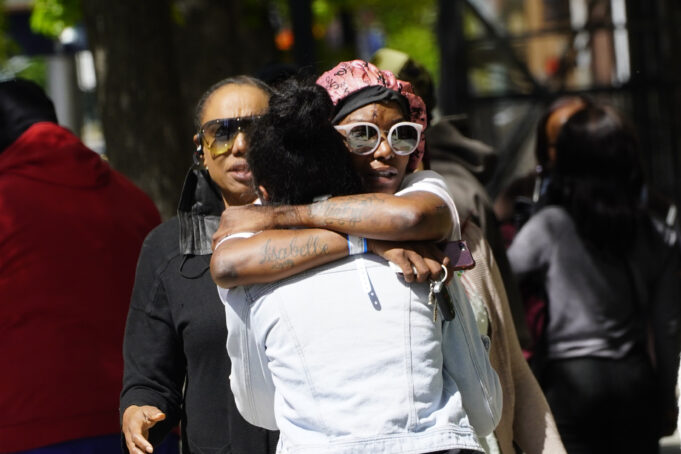by William P. Muhammad, Michael Z. Muhammad and Tariqah Muhammad
Facing yet another act of senseless gun violence, the American public is once again mourning the loss of life as partisanship and political gridlock stifle meaningful solutions to a rash of mass shootings and violence leading many to ask: “When and how it will all end?”
At Final Call presstime the United States had recorded at least 246 mass shooting incidents and counting in 2022. According to various media reports, the first weekend of June had a greater number of mass shooting deaths in the U.S. than the previous Memorial Day weekend.
June 3-5 saw at least 12 killed and at 38 injured in mass shootings, defined by the Gun Violence Archive as an incident in which “four or more people are shot or killed, not including the shooter.” The Gun Violence Archive is a database tracking gun deaths.
According to the archive, there were at least 12 mass shootings over Memorial Day weekend alone, which spanned Saturday, Sunday and Monday. [Monday was the federal holiday]. A June 1 shooting at a Tulsa, Oklahoma, medical facility, claimed the lives of four people.
In less than a three-week span, shooters armed with assault-style semi-automatic weapons killed more than 36 people, including 19 children in locations as diverse as Uvalde, Texas; Buffalo, New York and Tulsa, Oklahoma, leaving grief-stricken parents, loved ones and communities already burdened by the COVID-19 pandemic, economic uncertainty, and the prospects of another war overseas, to wonder who will be next?
Whether it is the seeming unending cycle of mass shootings in schools, places of worship, grocery stores and movie theatres or fratricidal gunplay and violence that plagues neighborhoods in cities around the country, the U.S. is caught in a web of death and destruction.

Fear, shattered lives and gun obsession
Lifelong Tulsa residents, Pledge Williams, 51, and his wife, Tamiko Williams, 49, told The Final Call that being behind schedule may have saved their lives as they arrived 10 minutes late to a doctor’s appointment at the Natalie Building of the Saint Francis Health Systems campus where a gunman killed four people before turning his weapon on himself June 1.
“We were on our way and the fire trucks were behind us, and before we knew it, police cars were coming out of nowhere in every direction (and) we knew it was something serious,” Mrs. Williams said while describing how she and her husband had just parked their truck near the site of the gunman’s rampage.
“A doctor told us to come inside the Warren Building, ‘there’s an active shooter right now,’ so I yelled for my husband (because) the shootings happened at the Natalie Building which was right next door. They didn’t want us standing outside,” she explained.
Stating how the elementary school shootings in Uvalde, Texas, just seven days prior made them hesitant about going to the hospital in the first place, Mr. Williams told The Final Call that it was their reflection of the news and their discussion of scripture before leaving that made them late to their appointment and that this is what may have prevented them from becoming two more casualties.
“I’m usually the type that likes to be overly early, and this is the first time that I actually did not go early, so if (we) would have come just 10 minutes earlier, like I normally do things, (we) would have been caught up in that,” Mr. Williams said.
The reasons for violence are known and documented. A nonpartisan survey conducted by the Small Arms Survey in 2018 showed that American gun ownership has risen to over 400 million guns. This is more than the population.
In the wake of the Coronavirus pandemic, gun sales increased even more. Gun production in the United States increased from 3.9 million in 2000 to 11.3 million in 2020, according to a recent report released by the Bureau of Alcohol, Tobacco, Firearms, and Explosives.

According to the Gun Violence Archive, in 2018, more than 1,500 children and teenagers younger than 18 were killed in homicides and accidental shootings, compared with about 1,380 in 2020.
Often lost in the national reactions and debates for or against gun control, incidents of mass shootings and domestic terrorism can overlook or ignore their devastating impact upon survivors and the specific communities in which they take place.
Among the Tulsa gunman’s four victims, including William Love, 73, Dr. Stephanie Husen, 48, and receptionist Amanda Glenn, 40, Dr. Preston Phillips, 59—the alleged target of the shooter’s rage—is remembered by colleagues, friends and former patients as a family man devoted to community service.
“We heard about the shooting at the hospital in the Natalie Building, and we knew that’s where he worked, and we didn’t know for sure if that was him or not, but during the course of the evening there was an indication that it may have been Dr. Phillips that was shot,” said George Haynes, a former patient of the popular physician in an interview with The Final Call.
“He was such a nice guy. I’ve been to his house for football games. He had been to my house for Christmas, and for my wife at events, either he was there, or his wife was there or his kids,” Mr. Haynes said of the slain doctor who was also his friend and neighbor.
“It seems like there is something going on every day now and then it gets this close (to) home. Going to the store becomes a worry, going to get gas becomes a worry, and when you have kids, you wonder (when) there’s a group of people, what’s going to happen?” he said.
Partisan divide, failed leadership
An outbreak of violence responsible for the death of 14 people on Memorial Day shattered Philadelphia in ongoing fratricidal violence that plague Black, Brown and White communities. In Chicago, 587 Blacks were shot in just the past 12 months compared to 27 Whites who were shot. In total, 733 people were shot in the past 12 months in Chicago.
The reasons for the violence are wide and varied, ranging from insulting social media posts to racism to revenge to mental health. Others argue the root cause is simply a society gone mad—the implosion of a society with no moral compass.
The answer for many activists is gun control, close background checks, gaps on private sales of long guns, mandatory reporting of lost or stolen firearms, increasing investment in safer communities, and passing extreme risk protection orders.
Partisan politics has rendered any meaningful changes mute; moves to change gun-related legislation are at a standstill. President Joe Biden gave a prime time address at the White House on June 2 calling for Congress to pass several gun control measures.
“After Columbine, after Sandy Hook, after Charleston, after Orlando, after Las Vegas, after Parkland, nothing has been done,” said Mr. Biden, naming some of the country’s mass shootings that have occurred through the years. “This time, that can’t be true. This time, we must actually do something. The issue we face is one of conscience and common sense,” he added.

While bipartisan talks are reportedly underway, there is little room for optimism for any substantive change on the federal level. On the state level in New York, lawmakers passed bills on June 2 to tighten state gun laws, including raising the minimum age to buy a semiautomatic rifle and a bill that would ban civilians from purchasing bullet-resistant vests, unless the individuals worked in law enforcement or other specific professions, reported several outlets.
But even with those types of steps on state levels, critics argue America’s cycle of violence and gun obsession is unlikely to change.
Tio Hardiman is president of the Violence Interrupters, a Chicago-based organization which operates on the city’s West and South side. He, like many others, believes that America’s obsession with guns and violence is almost incurable.
“Some people are just caught in the cycle of violence; if you find yourself in any type of conflict, the gun can neutralize any situation. I don’t think guns will ever go away. Some of the Founding Fathers put that 2nd amendment in there,” he told The Final Call.
Like many others, Mr. Hardiman sees firsthand the deadly effects of America’s obsession with firearms. His organization focuses on gang mediation and preventing retaliation between gangs. Easy access to firearms and the proliferation of the illegal gun trade is part of the problem, he said.
Kofi Ademola, a mentor for youth activists with Good Kids Mad City, also sees firsthand the effects of America’s obsession.
His organization regularly campaigns against Chicago violence and honors the names of the victims of violence and gun violence. Recently, the group supported the family of 19-year-old Delmonte Johnson who was shot to death in 2018.
“I always look at American history. We know the Europeans, to the Spaniards to the Dutch—when they were first coming, they were murdering the Indigenous who live here. We know America’s obsession was based on blood and homicide. They used trickery but they also used the gun. It has also been a staple in European warfare,” he told The Final Call.
“I think it’s always going to be the oppressed, marginalized folks (who are the victims). That fear of not being safe doesn’t go away, so they get caught with a gun and that’s another felony. We (Black people) definitely get the full brunt of it all because we are the most persecuted and the ones dying,” he said.
“Instead of pushing elective officials to make stricter gun laws, we have to find resources for mental health, trauma and housing and security. When communities are dealing with poverty and being taken away because they are being incarcerated, the violence goes up.”
Mr. Ademola believes that pushing elective officials to change gun laws would be a conflict of what the majority of Whites in the country stand for.
“It would contradict American values. On one end President Biden condemned the massive shooting (in Buffalo) but on the other end, he wants to fund the police. America is the biggest arms dealer in the world,” he continued.
Bilal Qayyum of the Philadelphia-based Father’s Day Rally Committee has long been at the forefront of the fight against gun violence. “America has a serious problem with guns,” he told The Final Call. “I hear all kinds of ridiculous numbers of guns. I mean, somebody told me there are more guns out there than it is people in America. The United States must decide how to regulate guns in this country. The crazy thing is that Americans do not want to deal with the issue of gun control,” Mr. Qayyum argued.
“I am deeply concerned about the leadership of the Congressional Black Caucus on this issue. It is not to say they are silent, but they do not seem aggressive in pushing this issue forward. I do not think the leadership is strong in this regard,” he added.
“As far as I know, they do not have a national plan. A few of them speak out about gun issues locally. There are White voices, congressional members who oppose guns. As far as I am aware, there isn’t a single Black congressperson who speaks out powerfully against gun violence,” said Mr. Qayyam.
Longtime Chicago community activist Victoria Brady said she believes it is a waste of time to depend entirely on lawmakers. “I was taught that where there is a will, there is a way. We cannot expect legislators to solve this problem without the involvement of us. … Regardless of our backgrounds or beliefs, we face many of the same challenges. We must unite and stand in solidarity, period,” she said.
Mitigating violence
In addition to the proliferation of mass shootings and other instances of gun violence across the country, regardless of intent, tensions remain high over the taking of lives whether they are fratricidal in nature, racially motivated, caused by mental illness, or as in the case of unarmed citizens, police violence classified as “justifiable homicide.”
Dennis Muhammad, founder and C.E.O. of the Ohio-based Peacekeepers Global Initiative and ENOTA Inc. (Educating Neighborhoods to Obey Those in Authority), told The Final Call that America’s overall preoccupation with guns is often the source of growing social anxiety, political vitriol, civil unrest and an increase in deadly confrontations.
He created his organizations to teach civility, starting in the home, and a separate training course to assist law enforcement officers in recognizing ways to better interact and operate in the communities they serve.
“Crime and violence is the direct result of unmet social needs,” Dennis Muhammad explained. “Any community that you see that has a high rate of unemployment, you’ll find gun violence, any community that has a high rate of drugs and alcohol addiction, you’ll find gun violence, (and) any community where you see an influx of domestic violence, of single-parented homes, of teenage pregnancy and all of this poverty, these are all social problems that cause gun violence or crime in our community,” said Dennis Muhammad, a longtime trainer of men in the Nation of Islam under the teachings of the Honorable Elijah Muhammad and leadership of Minister Louis Farrakhan.
Student Minister Lamond Muhammad, an educator and community activist, has long been involved in the Stop the Violence initiative instituted by Minister Farrakhan. In partnership with the 10,000 Fearless and the Black Male Community Council, he will be holding a youth forum on June 18 entitled “Surviving the Hood Youth Summit.” Young people are being traumatized by all that they are experiencing, he explained.
“The young people are saying that there are a lot of dysfunctions in the family, not having resources. Some say that it has to do with gangs while others say it is because of poor gun safety in the home,” he said.
“People purchase these guns through straw purchases. They have no safety on them; the guns are just left haphazardly in their homes or areas where youth have easy access,” Lamond Muhammad said youth have told him.
According to Associated Press, on June 10, parents of victims and survivors of the mass shootings in Buffalo and Uvalde will appear before a House committee in an effort to bring home the devastation of America’s gun violence epidemic.
The explosion of gun violence in the country is as the Honorable Elijah Muhammad said and wrote in his book, “The Fall of America,” explained Nation of Islam Southwest Regional Student Minister Abdul Haleem Muhammad. He pointed out there is a sword within the country and a sword outside of the country and that the people are suffering loss for failure to see the truth.
“It is as the Honorable Minister Louis Farrakhan wrote in ‘A Torchlight for America,’” Student Min. Haleem Muhammad said. “We have greed, and leadership’s state of mind is leading to anarchy because those in leadership continue to hide the truth and the people have no means to solve their problems. Where there’s hopelessness, there is violence,” he added. Student Min. Haleem Muhammad is based in Houston and heads Mosque No. 45 in the city.
Regarding the mass shootings that killed 19 fourth graders and two teachers at Robb Elementary School in Uvalde, Texas, on May 24, he told The Final Call that the proliferation of senseless gun violence is the logical conclusion of a country whose citizens hold more privately owned firearms than the entirety of its population.
Emphasizing that the culture of violence starts at the top, he added: “There is no superhero, that ever solved a problem in the movies without violence, and the top grossing film in America during Memorial Day weekend, when we should be remembering the war dead and those who gave their lives for the freedom of this country, is ‘Top Gun,’ he said.
“If that doesn’t tell you what the priority of America is, then nothing else will,” said Student Min. Haleem Muhammad.













